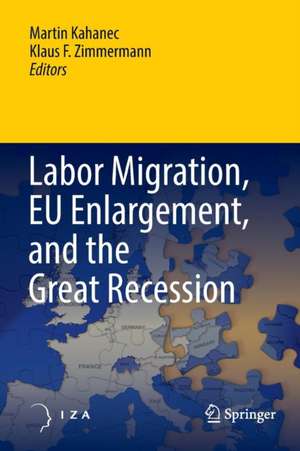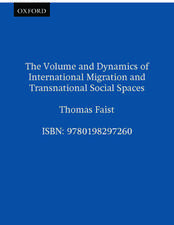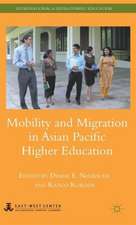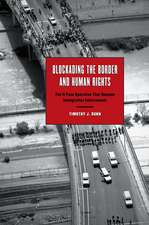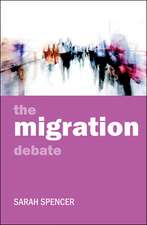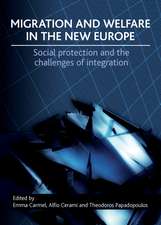Labor Migration, EU Enlargement, and the Great Recession
Editat de Martin Kahanec, Klaus F. Zimmermannen Limba Engleză Paperback – 26 mai 2018
| Toate formatele și edițiile | Preț | Express |
|---|---|---|
| Paperback (1) | 953.52 lei 6-8 săpt. | |
| Springer Berlin, Heidelberg – 26 mai 2018 | 953.52 lei 6-8 săpt. | |
| Hardback (1) | 959.67 lei 6-8 săpt. | |
| Springer Berlin, Heidelberg – 19 mai 2016 | 959.67 lei 6-8 săpt. |
Preț: 953.52 lei
Preț vechi: 1162.82 lei
-18% Nou
Puncte Express: 1430
Preț estimativ în valută:
182.45€ • 191.01$ • 150.97£
182.45€ • 191.01$ • 150.97£
Carte tipărită la comandă
Livrare economică 05-19 aprilie
Preluare comenzi: 021 569.72.76
Specificații
ISBN-13: 9783662568804
ISBN-10: 3662568802
Ilustrații: VIII, 476 p. 94 illus.
Dimensiuni: 155 x 235 mm
Greutate: 0.68 kg
Ediția:Softcover reprint of the original 1st ed. 2016
Editura: Springer Berlin, Heidelberg
Colecția Springer
Locul publicării:Berlin, Heidelberg, Germany
ISBN-10: 3662568802
Ilustrații: VIII, 476 p. 94 illus.
Dimensiuni: 155 x 235 mm
Greutate: 0.68 kg
Ediția:Softcover reprint of the original 1st ed. 2016
Editura: Springer Berlin, Heidelberg
Colecția Springer
Locul publicării:Berlin, Heidelberg, Germany
Cuprins
The Free Movement of Workers in an Enlarged European Union: Institutional Underpinnings of Economic Adjustment.- The Redistributive Impacts of Migration after the EU's Eastern Enlargement.- Migration in Italy is Backing the Old Age Welfare.- Migration 10 Years After: EU Enlargement, Closed Borders, and Migration to Germany.- Ireland's Recession and the Immigrant-native Earnings Gap.- Post-enlargement Migration and Adjustment in a Receiving Country: The Case of Sweden.- Labor Mobility as an Adjustment Mechanism in the UK during the Great Recession.- Migration, Crisis and Adjustment in an Enlarged EU: The Spanish Perspective.- Did Post-enlargement Labor Mobility Help the EU to Adjust during the Great Recession? The Case of Slovakia.- Migration as an Asset? Polish Returnees at the Time of the Crisis.- Should I Stay or Should I Go? Romanian Migrants during Transition and Enlargements.- The Experiences of a New Emigrant Country: Emerging Migration from Hungary.- Migration Experience of the Baltic Countries in the Context of Economic Crisis.- Labor Market Transitions during the Great Recession in Estonia.- Labor Market Policies and Labor Market Flexibility during the Great Recession: The Case of Estonia.- Returning Home at Times of Trouble? Return Migration of EU Enlargement Migrants during the Crisis.- EU Post-Enlargement Migration and the Great Recession: Lessons and Policy Implications.
Notă biografică
Martin Kahanec is Associate Professor and PhD track representative (Public Policy) at the Central European University in Budapest and founder and Scientific Director of the Central European Labour Studies Institute (CELSI) in Bratislava. At the same time Kahanec is Visiting Research Fellow, Deputy Program Director "Migration", the leader of the research sub-area EU Enlargement and the Labor Markets and former Deputy Director of Research (2009) at the Institute for the Study of Labor (IZA) in Bonn, Germany. He has held several advisory positions and leading roles in a number of scientific and policy projects with the World Bank, the European Commission, and other international and national institutions. Among his publications are various contributions to the economics of migration.
Klaus F. Zimmermann is Director of the Institute for the Study of Labor (IZA) in Bonn, Germany as well as Full Professor of Economics at the University of Bonn and Honorary Professor at the Free University of Berlin and the Renmin University of China. Among others he serves as fellow of various scientific institutions and member of the Academia Europaea, the German Academy of Sciences Leopoldina, and the World Economic Forum’s Global Agenda Council on Migration. Zimmermann regularly advises the World Bank, the European Commission, the European Parliament and governments on the national and international level. Migration and labor mobility are at the core of his intensive research and policy advice activities. His numerous publications in the field cover all aspects of worldwide migration flows, ethnic diversity, and labor market integration.
Klaus F. Zimmermann is Director of the Institute for the Study of Labor (IZA) in Bonn, Germany as well as Full Professor of Economics at the University of Bonn and Honorary Professor at the Free University of Berlin and the Renmin University of China. Among others he serves as fellow of various scientific institutions and member of the Academia Europaea, the German Academy of Sciences Leopoldina, and the World Economic Forum’s Global Agenda Council on Migration. Zimmermann regularly advises the World Bank, the European Commission, the European Parliament and governments on the national and international level. Migration and labor mobility are at the core of his intensive research and policy advice activities. His numerous publications in the field cover all aspects of worldwide migration flows, ethnic diversity, and labor market integration.
Textul de pe ultima copertă
This volume extends and deepens our knowledge about cross-border mobility and its role in an enlarged EU. More specifically, its main purpose is to enlighten the growing and yet rather uninformed debate about the role of post-enlargement migration for economic adjustment in the crisis-stricken labor markets of the Eurozone and the EU as a whole. The book addresses the political economy aspects of post-enlargement migration, including its broader political contexts, redistributive impacts, but also nationalization of the enlargement agenda. It also covers the experience of receiving and sending countries with post-enlargement migration and its role during the current crisis. Renowned experts in the field study, whether and how post-enlargement mobility has enabled the EU to absorb asymmetric economic shocks, how it has affected the European welfare systems, and whether it has contributed to the sustainability of the Eurozone. The authors also evaluate brain circulation as a sought-after vehicle of improved allocative efficiency of EU labor markets and propose a policy agenda for mobility in an enlarged EU.
Caracteristici
Addresses some of the most controversial and debated topics in contemporary migration in an enlarged EU, including the effects of the economic crisis
Deeply rooted in rigorous analysis of hard data, thereby distinguishing myths and reality of EU mobility
Useful reference and guide for scholars, interested professionals and policy makers
Strongly opposes to recent policy debates in EU member states on new restrictions for mobility and labor migration
Deeply rooted in rigorous analysis of hard data, thereby distinguishing myths and reality of EU mobility
Useful reference and guide for scholars, interested professionals and policy makers
Strongly opposes to recent policy debates in EU member states on new restrictions for mobility and labor migration
